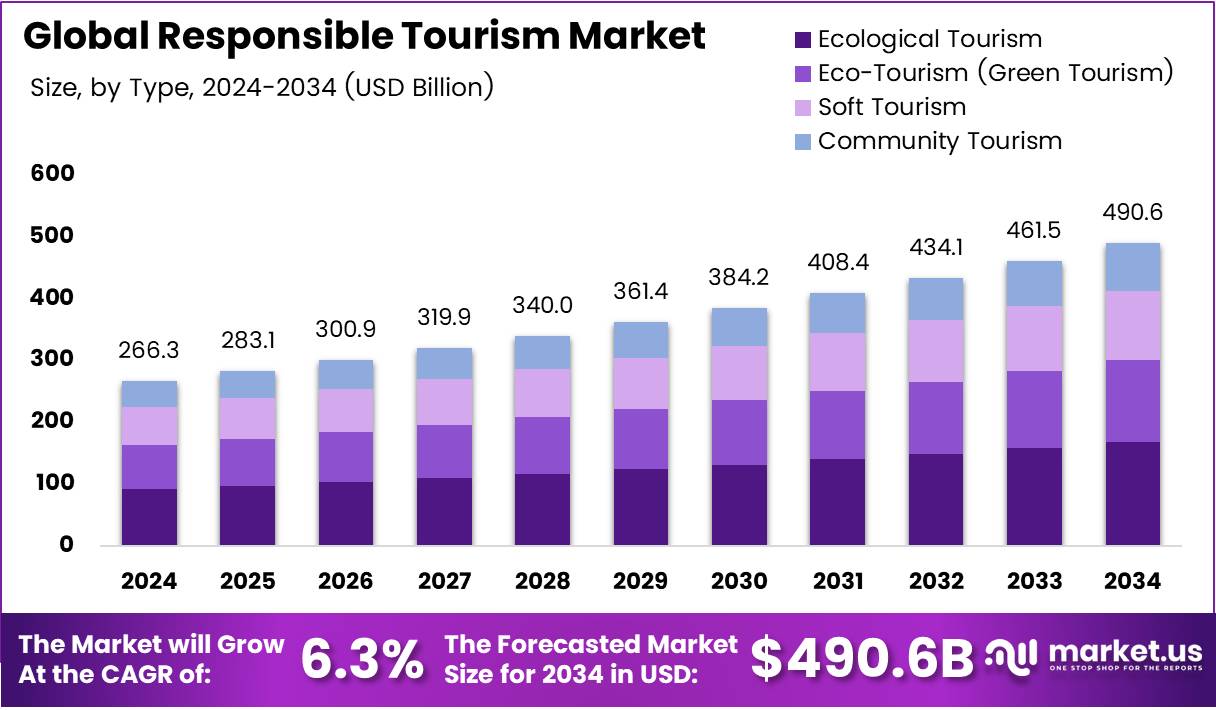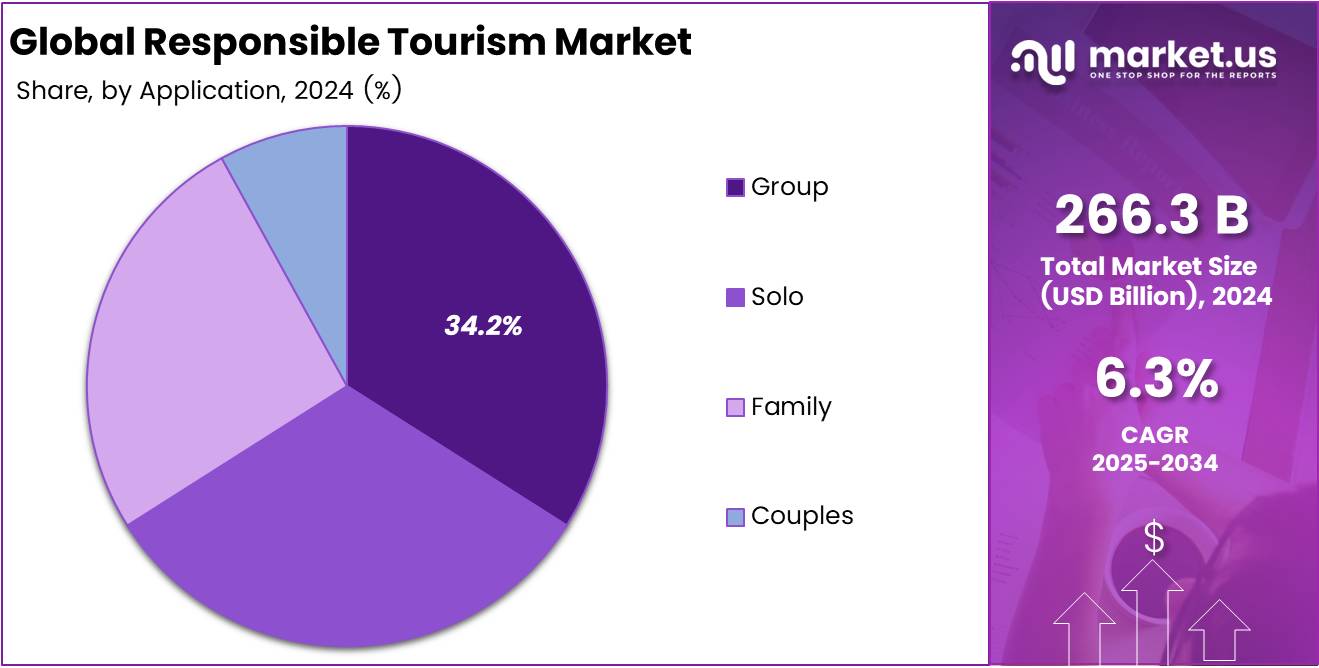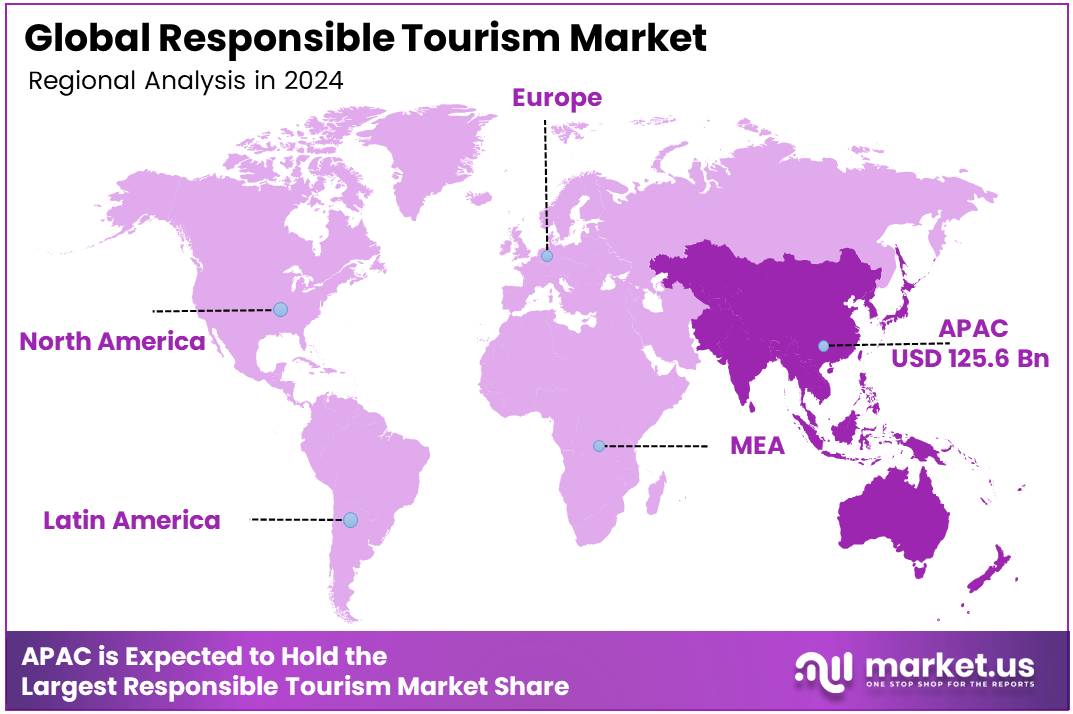Global Responsible Tourism Market Size, Share, Growth Analysis By Type (Ecological Tourism, Eco-Tourism (Green Tourism), Soft Tourism, Community Tourism), By Consumer Orientation (Women, Men), By Tourism Type (Domestic, International), By Tourist Type (Independent Traveler, Tour Group, Package Traveler), By Region and Companies - Industry Segment Outlook, Market Assessment, Competition Scenario, Statistics, Trends and Forecast 2025-2034
- Published date: Jul 2025
- Report ID: 153943
- Number of Pages: 276
- Format:
-
keyboard_arrow_up
Quick Navigation
Report Overview
The Global Responsible Tourism Market size is expected to be worth around USD 490.6 Billion by 2034, from USD 266.3 Billion in 2024, growing at a CAGR of 6.3% during the forecast period from 2025 to 2034.
Responsible tourism focuses on minimizing the negative impacts of tourism on the environment, culture, and local communities. It aims to create a balance between the growth of the travel industry and sustainability by promoting ethical travel practices. As the global awareness of environmental issues increases, responsible tourism is becoming more mainstream.

The market for responsible tourism is expanding as both travelers and businesses increasingly prioritize sustainability. This market growth is driven by the rising demand for eco-friendly travel experiences, including green accommodations, low-carbon transport, and ethical tours. With this, travelers are seeking meaningful experiences that align with their values, offering a significant opportunity for businesses to cater to these needs.
Government investments and regulations are essential in fostering the responsible tourism market. Governments worldwide are recognizing the importance of sustainable tourism practices. Many countries are implementing policies and incentives to encourage eco-friendly tourism development. Additionally, local regulations on waste reduction, carbon emissions, and environmental preservation further contribute to the market’s growth.
Consumer behavior reflects a growing interest in sustainable travel, with more people willing to pay a premium for eco-friendly options. According to Booking.com’s 2023 Sustainable Travel Report, 76% of travelers expressed a desire to embrace sustainable travel plans in the next year. This shift in consumer demand is creating new opportunities for businesses to tap into the responsible tourism sector.
Additionally, a YouGov survey revealed that 53% of global consumers are willing to pay more for sustainable travel options. This includes preferences for eco-friendly accommodations and authentic local experiences, highlighting the market’s potential. Businesses that prioritize sustainability in their offerings stand to benefit from increased consumer loyalty and higher revenues.
However, there remains a significant value-action gap. According to a study cited by TIME, 81% of consumers want to act more sustainably, but only 29% have found ways to change their behavior. This gap presents a challenge for the responsible tourism market, as it indicates that while consumers express interest in sustainability, practical steps are still limited.
Key Takeaways
- The Global Responsible Tourism Market size is projected to reach USD 490.6 Billion by 2034, growing at a CAGR of 6.3% from 2025 to 2034.
- In 2024, Ecological Tourism led the market with a 34.2% share, driven by rising awareness of sustainability and environmental conservation.
- Women accounted for 56.7% of the market in 2024, reflecting a significant trend in consumer preferences for responsible tourism.
- Domestic tourism captured 59.5% of the market in 2024, driven by global uncertainties and a growing interest in local destinations.
- Independent Travelers held 44.1% of the market in 2024, driven by the demand for personalized, flexible, and immersive travel experiences.
- The Group segment dominated with a 34.2% share in 2024, fueled by the popularity of group-based travel experiences offering social interaction and convenience.
- The Asia Pacific (APAC) region held a leading market share of 47.2%, valued at USD 125.6 Billion in 2024, due to eco-friendly travel demand and government initiatives.
By Type Analysis
Ecological Tourism held a dominant market position with 34.2% share in 2024.
In 2024, Ecological Tourism emerged as the leading segment in the Responsible Tourism Market, commanding a significant 34.2% share. This growth is attributed to the increasing awareness surrounding sustainability and environmental conservation. Eco-conscious travelers are increasingly prioritizing responsible tourism practices, which has bolstered the prominence of ecological tourism globally.
Eco-Tourism, or Green Tourism, which is closely linked to ecological principles, has further contributed to the expansion of this segment. This form of tourism emphasizes minimal environmental impact, encouraging travelers to explore natural settings in ways that promote conservation efforts. Its alignment with global sustainability initiatives has resonated with a large and growing consumer base.
Soft Tourism and Community Tourism, while also important, are growing at a more moderate pace. These forms of tourism prioritize personal well-being and community involvement, respectively, but still represent a smaller portion of the overall responsible tourism market when compared to Ecological Tourism.
Consumer Orientation Analysis
Women held a dominant market position with 56.7% share in 2024.
In 2024, the Responsible Tourism Market saw women holding a commanding market share of 56.7%, reflecting a significant trend in consumer preferences. Female travelers have increasingly been drawn to responsible tourism for its focus on sustainability, cultural sensitivity, and ethical travel practices.
Women often play a pivotal role in making travel decisions, and their preference for experiences that align with personal values and environmental consciousness has helped propel the growth of the responsible tourism segment. The trend is further fueled by a desire for authentic, mindful travel experiences that foster positive social and environmental impacts.
Men, while also contributing to the market, account for a smaller share in comparison. As the global tourism landscape evolves, the increasing influence of women in the travel sector will continue to shape future demand patterns.
Tourism Type Analysis
Domestic tourism dominated with 59.5% share in 2024.
In 2024, Domestic tourism emerged as the leading segment in the Responsible Tourism Market, capturing a market share of 59.5%. This surge in domestic tourism can be attributed to the ongoing global uncertainties, such as travel restrictions and a renewed interest in exploring local destinations.
The preference for domestic travel is also driven by the desire to reduce carbon footprints and support local economies. Responsible travelers are increasingly opting for local experiences that have a smaller environmental impact while benefiting communities. Furthermore, the rising awareness of sustainable travel practices has bolstered the domestic tourism sector’s growth.
International tourism, although significant, represents a smaller share of the market. International travel often involves higher carbon footprints and greater logistical challenges, which are prompting more tourists to explore domestic options.
Tourist Type Analysis
Independent Traveler led the segment with 44.1% share in 2024.
In 2024, Independent Travelers held the largest share in the Responsible Tourism Market, accounting for 44.1% of the market. This growth reflects a growing trend among tourists seeking more personalized, flexible, and immersive travel experiences.
Independent travelers prioritize autonomy in planning their trips and are often more inclined to engage in responsible tourism practices such as supporting local businesses and minimizing environmental impact.
Tour Groups and Package Travelers, while still important, contribute less to the overall market. Package travel often involves more conventional, larger-scale trips, which can sometimes limit the sustainability and environmental impact of the tourism experience.
However, as responsible tourism continues to evolve, both Tour Groups and Package Travelers are slowly adapting to include more eco-friendly options. Despite this, the dominance of Independent Travelers in this segment remains a key feature of the market.
Application Analysis
Group held a dominant market position with 34.2% share in 2024.
In 2024, the Group segment dominated the Responsible Tourism Market, capturing a market share of 34.2%. This strong performance is primarily driven by the increasing trend of group-based travel experiences, which offer both social interaction and convenience. Group travel has grown in popularity due to the ease of planning, shared costs, and the opportunity for social connection, making it a preferred option for many travelers seeking meaningful, yet accessible, experiences.
Solo travel, although growing in popularity, accounted for a smaller portion of the market. Solo travelers tend to seek more individualized and flexible experiences, which align with the broader trends of independence and personal exploration within the responsible tourism sector. As more travelers embrace solo trips, their impact remains more niche compared to group-focused travel.
Family and Couples segments continue to play vital roles in the market but represent a more moderate share in comparison to group travel. Families tend to prioritize experiences that are educational, family-friendly, and safe, while couples often seek romantic, peaceful destinations.

Key Market Segments
By Type
- Ecological Tourism
- Eco-Tourism (Green Tourism)
- Soft Tourism
- Community Tourism
By Consumer Orientation
- Women
- Men
By Tourism Type
- Domestic
- International
By Tourist Type
- Independent Traveler
- Tour Group
- Package Traveler
Drivers
Growing Consumer Awareness about Environmental Impact Drives Responsible Tourism Market Growth
The rise in consumer awareness about the environmental impact of travel is shaping the responsible tourism market. Travelers are increasingly prioritizing sustainability, which pushes businesses to adopt eco-friendly practices. This shift is evident as more travelers demand sustainable travel options, including eco-friendly accommodations, transportation, and destinations.
Consequently, responsible tourism is gaining traction, with both consumers and businesses focusing on reducing their carbon footprint. This growing awareness is expected to continue driving market growth as environmental concerns remain a key priority for travelers globally.
Restraints
Limited Availability of Responsible Travel Infrastructure Challenges Market Growth
One significant challenge facing the responsible tourism market is the limited availability of responsible travel infrastructure. Many destinations still lack the necessary facilities to accommodate eco-conscious travelers, such as green-certified hotels or sustainable transport options. This gap presents barriers for both tourists and service providers aiming to implement sustainable practices.
Moreover, developing the required infrastructure requires substantial investment, making it a slow process in some regions. As a result, destinations with insufficient responsible travel infrastructure struggle to meet the rising demand for eco-friendly tourism.
Growth Factors
Development of Green Tourism Certification Programs Expands Growth Opportunities
Green tourism certification programs are one of the key growth opportunities in the responsible tourism market. These programs encourage businesses to adopt sustainable practices while offering consumers a way to identify eco-friendly options. As demand for sustainable tourism options grows, certification programs provide travelers with transparency and confidence in their choices.
Additionally, the growing popularity of eco-tourism in emerging regions presents a significant opportunity. These regions are becoming key players in sustainable tourism, contributing to global market growth by promoting responsible travel.
Emerging Trends
Digital Platforms for Promoting Sustainable Travel Drive Market Trends
Digital platforms are increasingly being used to promote sustainable travel, making them a trending factor in the responsible tourism market. Platforms that offer eco-friendly travel options, such as green hotels, eco-tours, and sustainable transportation, are gaining popularity.
In addition, partnerships between travel agencies and environmental NGOs are strengthening efforts to drive sustainability in tourism. These partnerships aim to raise awareness and foster responsible travel habits among consumers. Furthermore, the rising demand for ethical wildlife tourism reflects a growing interest in responsible travel, as more travelers seek experiences that align with their values.
Regional Analysis
Asia Pacific Dominates the Responsible Tourism Market with a Market Share of 47.2%, Valued at USD 125.6 Billion
In 2024, the Asia Pacific (APAC) region holds the dominant market share in the Responsible Tourism Market, with a market share of 47.2%, valued at USD 125.6 Billion. This growth is driven by the increasing demand for eco-friendly travel options and the rise in government initiatives aimed at promoting sustainable tourism practices. The region benefits from a large population and expanding middle class, which is becoming more conscious of environmental issues and sustainability in travel.

North America Responsible Tourism Market Trends
North America is a significant player in the Responsible Tourism Market, with a growing number of consumers preferring sustainable travel experiences. The U.S. and Canada are at the forefront of this movement, with increasing consumer awareness about the environmental impact of travel. The region is also seeing higher adoption of eco-tourism and green travel practices supported by local governments and tourism organizations.
Europe Responsible Tourism Market Trends
Europe has been an early adopter of responsible tourism, with several countries implementing regulations that support sustainable tourism practices. The market is expected to grow steadily, driven by increasing awareness among consumers about environmental issues. Strong governmental support for green tourism initiatives and the rise in eco-conscious travelers are key growth factors for this region.
Middle East and Africa Responsible Tourism Market Trends
The Middle East and Africa region are gradually embracing responsible tourism, with growing investment in sustainable tourism infrastructure. While the market share is smaller compared to other regions, there is a significant rise in eco-tourism and community-focused travel experiences. Government initiatives are expected to boost responsible tourism in these regions, with a focus on preserving local cultures and natural resources.
Latin America Responsible Tourism Market Trends
Latin America is seeing a shift toward more sustainable tourism practices, especially in countries like Costa Rica and Brazil, which are known for their eco-tourism offerings. While the region’s market share is relatively smaller, there is an increasing focus on preserving biodiversity and offering travelers authentic local experiences. The growth in eco-tourism and government backing for sustainable travel is expected to drive the market forward in the coming years.
Key Regions and Countries
North America
- US
- Canada
Europe
- Germany
- France
- The UK
- Spain
- Italy
- Rest of Europe
Asia Pacific
- China
- Japan
- South Korea
- India
- Australia
- Rest of APAC
Latin America
- Brazil
- Mexico
- Rest of Latin America
Middle East & Africa
- GCC
- South Africa
- Rest of MEA
Key Responsible Tourism Company Insights
In 2024, Intrepid Travel remains a leader in the responsible tourism sector, leveraging its extensive portfolio of sustainable travel experiences. The company focuses on small group tours that minimize environmental impact and promote local community engagement, strengthening its position as a pioneer in ethical travel.
Much Better Adventures stands out by offering adventure tourism experiences that emphasize sustainability and community involvement. Known for their dedication to reducing carbon footprints, they attract travelers who prioritize eco-friendly and socially responsible travel options, further contributing to the growing demand for responsible tourism.
Undiscovered Mountains is a notable player in the responsible tourism market, specializing in off-the-beaten-path destinations. By promoting lesser-known regions and responsible travel practices, they provide unique and low-impact travel experiences, ensuring that tourism benefits local communities without overwhelming them.
Adventure Alternative is committed to providing ethical travel options with a focus on cultural preservation and environmental sustainability. Through its tailored adventure tours, the company helps travelers engage with local cultures and ecosystems in a manner that prioritizes long-term positive impacts on both the environment and the community.
These companies are at the forefront of promoting responsible tourism, capitalizing on the increasing consumer demand for sustainable travel experiences. Their strategies highlight a growing shift towards eco-conscious and socially responsible tourism options, which are expected to play a key role in the sector’s growth in the coming years.
Top Key Players in the Market
- Intrepid Travel
- Much Better Adventures
- Undiscovered Mountains
- Adventure Alternative
- Global Himalayan Expedition
- TUI Group
- The Travel Corporation (TTC)
- Wilderness Safaris
Recent Developments
- In November 2024, FairMoove strengthens its commitment to sustainability by acquiring We Go GreenR and FiG, enhancing its portfolio of eco-friendly initiatives and expanding its influence in the green travel sector.
- In June 2025, Intrepid Travel takes a significant step into eco-friendly hospitality by acquiring new properties in Tasmania and Marrakech, further solidifying its position in the sustainable travel market.
Report Scope
Report Features Description Market Value (2024) USD 266.3 Billion Forecast Revenue (2034) USD 490.6 Billion CAGR (2025-2034) 6.3% Base Year for Estimation 2024 Historic Period 2020-2023 Forecast Period 2025-2034 Report Coverage Revenue Forecast, Market Dynamics, Competitive Landscape, Recent Developments Segments Covered By Type (Ecological Tourism, Eco-Tourism (Green Tourism), Soft Tourism, Community Tourism), By Consumer Orientation (Women, Men), By Tourism Type (Domestic, International), By Tourist Type (Independent Traveler, Tour Group, Package Traveler) Regional Analysis North America (US and Canada), Europe (Germany, France, The UK, Spain, Italy, and Rest of Europe), Asia Pacific (China, Japan, South Korea, India, Australia, and Rest of APAC), Latin America (Brazil, Mexico, and Rest of Latin America), Middle East & Africa (GCC, South Africa, and Rest of MEA) Competitive Landscape Intrepid Travel, Much Better Adventures, Undiscovered Mountains, Adventure Alternative, Global Himalayan Expedition, TUI Group, The Travel Corporation (TTC), Wilderness Safaris Customization Scope Customization for segments, region/country-level will be provided. Moreover, additional customization can be done based on the requirements. Purchase Options We have three licenses to opt for: Single User License, Multi-User License (Up to 5 Users), Corporate Use License (Unlimited User and Printable PDF) 
-
-
- Intrepid Travel
- Much Better Adventures
- Undiscovered Mountains
- Adventure Alternative
- Global Himalayan Expedition
- TUI Group
- The Travel Corporation (TTC)
- Wilderness Safaris










